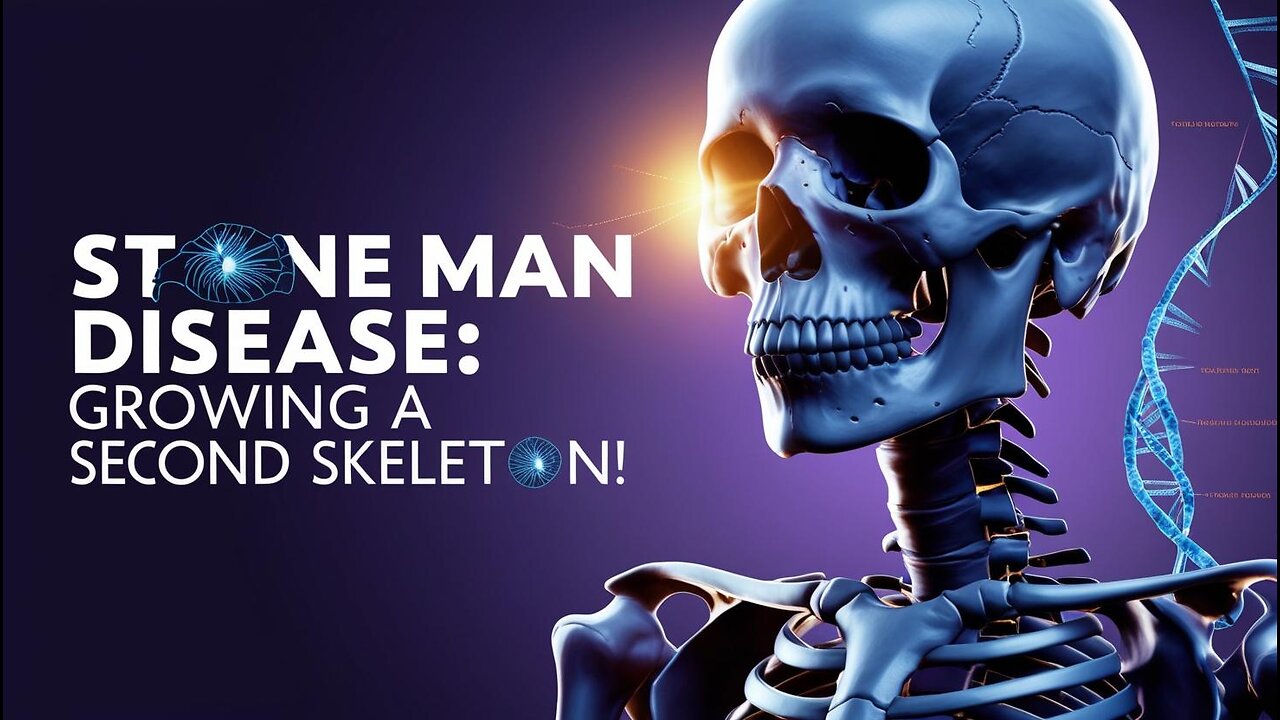Premium Only Content

Stone Man Disease: The Rare Condition Causing a SECOND Skeleton (FOP Explained)
Stone Man Disease (Fibrodysplasia Ossificans Progressiva or FOP) is a rare and devastating condition that causes the body to grow a second skeleton, turning soft tissues and muscles into bone. This condition results in immobility, and patients face the terrifying prospect of becoming completely trapped in their own bodies as they develop a "second skeleton" over time.
🔬 Key Insights in This Video:
What is Stone Man Disease? Learn how the condition fibrodysplasia ossificans progressiva (FOP) is caused by a mutation in the ACVR1 gene, leading to abnormal bone growth in places it shouldn’t form.
Rare and Mysterious: FOP is extremely rare, affecting approximately 1 in 1 million people worldwide. It is not influenced by ethnicity or gender.
Symptoms and Early Warning Signs: From malformed toes and thumbs to the gradual stiffening of muscles, FOP symptoms are difficult to detect but devastating once they begin.
Flare-Ups & Trauma Triggers: Discover how FOP flare-ups occur, and how minor trauma like an injury, surgery, or even a viral infection can accelerate the condition.
Impact on Quality of Life: The progression of FOP can cause severe spinal deformity, difficulty speaking, eating, and even hearing loss.
🔍 What We Explore:
Genetic Mutation: How the ACVR1 gene mutation triggers abnormal bone growth and how it affects skeletal development.
Treatment and Research: Current progress in finding treatments for FOP, as well as genetic research aimed at managing the disease.
Support and Awareness: Understanding the importance of support for rare diseases and increasing awareness of the struggles faced by people with Stone Man Disease.
👉 This video breaks down everything you need to know about Fibrodysplasia Ossificans Progressiva, including genetic causes, the symptoms of FOP, and its impact on the quality of life of those affected. Plus, learn about the most promising avenues of genetic research and treatment for this rare disorder.
Don’t forget to hit the LIKE button if you found this video informative, and SUBSCRIBE to our channel for more on rare genetic diseases, medical breakthroughs, and health research. Leave your thoughts in the comments below – we’d love to hear from you! 🔔
-
 1:45:44
1:45:44
megimu32
6 hours agoON THE SUBJECT: Make 90s Movies Great Again
39.3K10 -
 59:46
59:46
Man in America
13 hours agoAI mRNA Vaccines, Turbo Cancer & Blood Clots... What Could Go Wrong?! w/ Tom Haviland
31.6K14 -
 1:09:15
1:09:15
Precision Rifle Network
1 day agoS4E3 Guns & Grub - Trump a new era for gun rights?
57.9K7 -
 1:05:31
1:05:31
Glenn Greenwald
8 hours agoSection 702 Warrantless Surveillance Ruled Unconstitutional: Press Freedom Advocate Seth Stern Explains; The Rise of Unions & the Impact of Trump's Populism with Author Eric Blanc | SYSTEM UPDATE #395
96.8K90 -
 1:01:13
1:01:13
The Amber May Show
7 hours ago $2.63 earnedWomen Of Rumble | Amber, Kelly and Wendy Wild
38.9K4 -
 1:16:38
1:16:38
Josh Pate's College Football Show
8 hours ago $1.82 earnedCFP Title Viewership | JP Poll Under Attack | Bama & Oregon Season Grades | Most To Prove In 2025?
39.3K -
 LIVE
LIVE
VOPUSARADIO
13 hours agoPOLITI-SHOCK! "THE TIDE IS TURNING"! 3 SPECIAL GUESTS JOINING US TONIGHT!
243 watching -
 52:47
52:47
Kimberly Guilfoyle
11 hours agoDismantling DEI Once and For All, Live with Tyler O’Neil & Eric Deters | Ep.190
92.9K33 -
 1:34:59
1:34:59
Redacted News
10 hours agoBREAKING! TRUMP SIGNS ORDER TO RELEASE JFK FILES, CIA IS FURIOUS | REDACTED NEWS
218K396 -
 1:36:09
1:36:09
Benny Johnson
11 hours ago🚨WATCH: President Trump Declassifies JFK, RFK, MLK Files LIVE Right Now in Oval Office, History Now
166K315